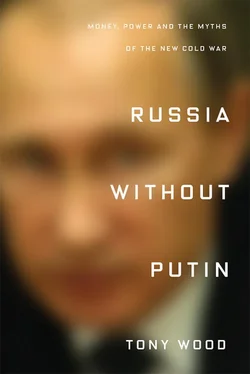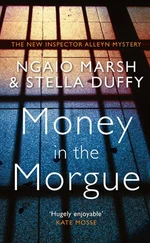In fact, a substantial portion of those who now described themselves as ‘middle class’ were working-class people of very modest means. Many of them inhabited what journalist Evgeniia Pishchikova dubbed ‘five-storey Russia’, after the Khrushchev-era buildings in which much of the population still lived. Their consumption habits, she observed, involved a patient process of exploration and comparison, making each transaction significant, almost a miniature rite of passage. In a sense, this made them ‘ideal consumers’: ‘much more loyal and informed than people who are better off than they, because for the latter, the interval between wanting to buy and making the purchase is too short’. {60} 60 Evgeniia Pishchikova, Piatietazhnaia Rossiia , Moscow 2009, p. 164.
Yet at the same time, many of those who might have been defined as middle-class by their occupational status and education were suffering declining wages and even poverty. In one 2010 study, people with higher degrees accounted for a fifth of those deemed ‘poor’ or ‘disadvantaged’. {61} 61 Natalia Tikhonova, ‘Maloobespechennost’ v sovremennoy Rossii’, Sotsiologicheskie issledovaniia , No. 1, 2010, p. 10.
These sectors of the ‘middle class’ were being proletarianized, even as the onetime proletariat redefined itself as ‘middle class’.
There was, in effect, a mismatch between the social identities Russians claimed and their socioeconomic positions. While the majority might consider themselves members of a single ‘middle class’, the society that emerged in the 2000s – built on the disparities generated in the previous decade – consisted of several groups that differed hugely from one another: oligarchs, petty traders, industrial workers, migrant labourers, professionals, white-collar ‘office plankton’, and so on. Yet the disparities between these groups appeared less stark than they might have, thanks to the persistence of Soviet structures alongside emergent capitalist forms. This was visible to any visitor to Russia as a collision of social epochs, a kind of ‘combined and uneven social development’ – pensioners carrying portraits of Stalin alongside teenagers wielding iPhones; glass-and-steel skyscrapers looming over rickety barracks-style housing. It also had less tangible consequences: the lingering ghosts of Soviet social structures shielded the Putin regime from serious class conflict just as they had Yeltsin’s. Much has been made of Putin’s good fortune in coming to power amid an oil boom. Inheriting the ‘subsidy’ provided by the parallelism of old and new was yet another piece of world-historical luck.
Yet this subsidy could not last indefinitely: by definition it was temporary, the product of the continued survival of previous social structures and identities. By the 2000s what remained of Soviet institutions was becoming increasingly hollow, and the generations who had experienced life in the USSR were dwindling, succeeded by people whose lives had been shaped entirely by capitalism. This, of course, is exactly what the liberal reformers of the 1990s wished for: the final disintegration of the state-socialist system and the emergence of New Russians untainted by the mentality of Homo sovieticus . Sometimes this wish was expressed in decidedly ugly terms: in 1997 the liberal politician Boris Nemtsov declared that Russia must enter the twenty-first century ‘only with young people’. The same year, IMF managing director Michel Camdessus told a press conference that the structural adjustment policies his organization was insisting on might well require Russia to ‘sacrifice a generation’. {62} 62 Nemtsov quoted in Reddaway and Glinski, The Tragedy of Russia’s Reforms , p. 632; Camdessus in Paul Kubicek, Organized Labor in Postcommunist States , Pittsburgh 2004, p. 226, n. 115.
But the underlying assumption – that the past was the main obstacle on the path to a better future – has been widely shared ever since, and has remained consistent over time.
Those calling for the Soviet past to be left behind should perhaps be careful what they wish for. That past, far from being a hindrance, has actively facilitated the construction of the new capitalist order – and when the last vestiges of the Soviet world have vanished, the subsidy that first Yeltsin and then Putin enjoyed will run out. The protests that burst onto the national stage in 2011, though widely interpreted as the political coming of age of the ‘new middle class’, are actually better understood as signs that the parallelism is fading. The factors that helped muffle discontent in the 1990s and early 2000s are ceasing to apply; meanwhile new grievances have emerged, as well as new ways of expressing them.
There is a historical irony lurking here. Though liberal critics, in Russia and the West, insist that it is the remnants of the USSR that stand in the way of Russian progress, it may well be that much stronger opposition to the ‘imitation democratic’ system will emerge from the post-Communist generations, and that new forms of collective defiance will be forged not out of nostalgia for socialism but out of their shared experiences of capitalism. The future may prove more radically stubborn than the receding past.
CHAPTER 4
An Opposition Divided
IN THE WINTER OF 2011–12, tens of thousands of Russians took to the streets to protest against the rigging of parliamentary elections, and against Putin’s seemingly inevitable return to the presidency. For a time, it looked as if the wave of unrest that had seized dozens of cities across the world that year – from Tunis to Cairo, Madrid to Athens, New York to Oakland – was now reaching some unlikely places. As well as large demonstrations in Moscow and St Petersburg, smaller gatherings took place across the country’s vast breadth, from Kaliningrad in the west to Vladivostok in the far east, from Ekaterinburg in the Urals and Volgograd in the south to Arkhangelsk and Murmansk in the Arctic; at least 3,000 people turned out in Novosibirsk, braving temperatures of −20°C.
These protests were widely hailed as signs of the reawakening of Russia’s civil society, and in particular of the country’s new middle class, which had apparently ‘become sufficiently affluent to assert its yearning for more accountability and less corruption’. {1} 1 Cliff Kupchan, ‘Putin’s New Constraints’, New York Times , 13 March 2012; see also ‘The reawakening of Russian politics’, Financial Times , 4 March 2012; Luke Harding, ‘Putin has six more years to draw level with Brezhnev’, Guardian , 4 March 2012.
Even if the movement could do little to prevent Putin’s re-election in March 2012, for many commentators the very fact of its existence meant that things could not carry on as before. The Financial Times and Economist concluded that the protests marked ‘the beginning of the end of the Putin era’. {2} 2 Gideon Rachman, ‘The ice is cracking under Putin’, Financial Times , 6 February 2012; ‘The beginning of the end of Putin’, Economist , 3 March 2012.
But several years later, the Putin era is apparently still in full swing – and if anything, his personal dominance of the political stage has grown. His crushing victory in the 2018 presidential election secured him another six-year mandate, extending his rule to 2024.
Why has Putin been able to overcome all challenges to his authority with such apparent ease? Why, in particular, was the protest movement of 2011–12 unable to sustain itself and pose a more serious threat to his hold on power? Several factors can help explain this, the most obvious being the sharp repressive turn taken by Putin on his return to the Kremlin in 2012, as he sought to muffle the opposition, locking up many protesters in prison and landing others with ruinous fines. The case of Pussy Riot was only the best-known example: after an absurd show trial, two of the group’s members were sentenced to two years in a penal colony for the briefest of punk provocations in Moscow’s Church of Christ the Saviour. The Kremlin’s adoption of a more aggressively nationalist stance after 2012 also played a role, especially amid the escalating confrontation with the West over Ukraine, Syria and accusations of Russian meddling in the US elections. Broad public support for its foreign policy gave the government some extra breathing room on the domestic front.
Читать дальше












